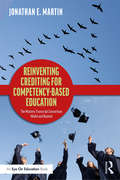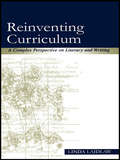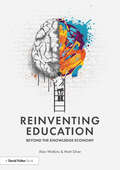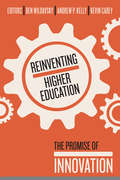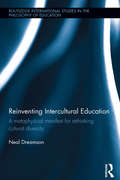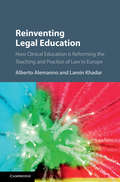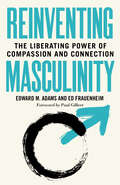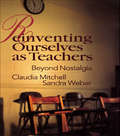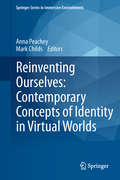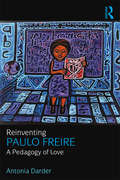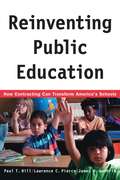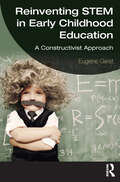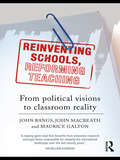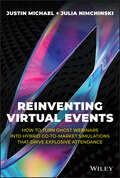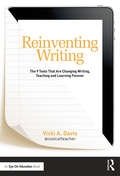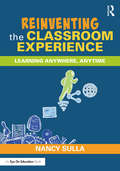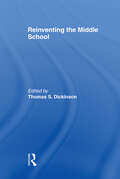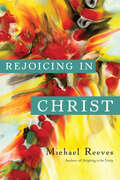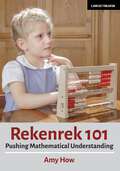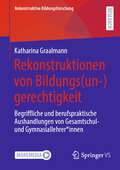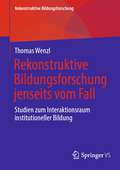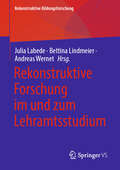- Table View
- List View
Reinventing Crediting for Competency-Based Education: The Mastery Transcript Consortium Model and Beyond
by Jonathan E. MartinMany argue that the conventional high school transcript has become irrelevant to today’s best practices in teaching, learning, and assessment. With more and more school leaders turning to alternate, competency-based approaches for learning, crediting and transcripts can follow suit by drawing on badging, micro-crediting, digital portfolios of student work, and other emerging tools. Reinventing Crediting for Competency-Based Education explores the need for this transformation while detailing the implementation of promising models, particularly the Mastery Transcript Consortium. Written by an experienced consultant and former school leader, this book will assist school and district administrators in making a forward-thinking crediting and transcript system work for their students’ futures.
Reinventing Curriculum: A Complex Perspective on Literacy and Writing
by Linda LaidlawIn this book, Linda Laidlaw explores the questions: What happens when children begin to write? Why is it that the teaching and practice of writing seems at times to be difficult in schools? How might teachers work differently to create more inviting spaces for developing literacy? The premise is that written texts and literacy processes are developed within a complex "weave" of particular contexts, or ecologies, and the unique particularity of the learner's experiences, histories, memories and interpretations. Laidlaw offers new information about writing and literacy pedagogy linked to current research in the complexity sciences and cognition, and considers the possibilities that might emerge for pedagogy when alternative metaphors, images, and structures are considered for writing and curriculum. The volume includes qualitative and narrative description of writing and literacy situations, events, and pedagogy, and elaborates the historical, theoretical, and curricular background in which such instruction exists within contemporary schooling.Reinventing Curriculum: A Complex-Perspective on Literacy and Writing:*addresses literacy through a focus on writing rather than on reading;*develops an approach to literacy and writing pedagogy that incorporates recent theories and research on learning and the complexity sciences;*examines perspectives on writing from both a teaching perspective and that of the work of writers;*makes connections between the acquisition of literacy to research in other domains;*examines both the benefits and the "costs" of literacy; and*challenges "commonsense" understandings within instruction, for example, that literacy teaching and learning can occur apart from other aspects of children's learning, context, and subjectivity, or that learning occurs individually rather than collectively.This book is important reading for researchers, professionals, teacher educators, and students involved in literacy education and writing instruction, and an excellent text for courses in these areas.
Reinventing Education: Beyond the Knowledge Economy
by Alan Watkins Matt SilverThe need for change in the education system is obvious and overwhelming. But each stakeholder group has its own ideas about why the system is broken and how to fix it. Competing priorities, political inertia and diminishing budgets maintain the dysfunctional status quo. This essential text examines the underlying causes behind the key challenges facing schools and argues that we need to move from knowledge transfer systems to a deliberately developmental approach that transforms capabilities including emotional regulation, systems thinking, critical analysis, creativity and collaborative capability.The chapters provide a framework for designing, constructing and implementing school systems that can transform the outcome in a classroom, school or trust.Topics covered include: Why education is a ‘wicked’ problem Why development must be central and sit alongside knowledge transfer (as AI takes over ‘expertise’) How motivation and value systems evolve and are key to change How to drive behaviour change to transform outcomes What human-centred means now in a reinvented system Offering much-needed insights, guidance and solutions for teachers, school leaders and policy-makers, this book will be valuable reading for all those interested in school improvement and education policy.
Reinventing Higher Education: The Promise of Innovation
by Ben Wildavsky Kevin Carey Andrew P. KellyThe inspiration for this timely book is the pressing need for fresh ideas and innovations in U.S. higher education. At the heart of the volume is the realization that higher education must evolve in fundamental ways if it is to respond to changing professional, economic, and technological circumstances, and if it is to successfully reach and prepare a vast population of students--traditional and nontraditional alike--for success in the coming decades. This collection of provocative articles by leading scholars, writers, innovators, and university administrators examines the current higher education environment and its chronic resistance to change; the rise of for-profit universities; the potential future role of community colleges in a significantly revised higher education realm; and the emergence of online learning as a means to reshape teaching and learning and to reach new consumers of higher education. Combining trenchant critiques of current conditions with thought-provoking analyses of possible reforms and new directions, Reinventing Higher Education is an ambitious exploration of possible future directions for revitalized American colleges and universities.
Reinventing Higher Education: The Promise of Innovation
by Ben WildavskyThe inspiration for this timely book is the pressing need for fresh ideas and innovations in U.S. higher education. At the heart of the volume is the realization that higher education must evolve in fundamental ways if it is to respond to changing professional, economic, and technological circumstances, and if it is to successfully reach and prepare a vast population of students—traditional and nontraditional alike—for success in the coming decades. This collection of provocative articles by leading scholars, writers, innovators, and university administrators examines the current higher education environment and its chronic resistance to change; the rise of for-profit universities; the potential future role of community colleges in a significantly revised higher education realm; and the emergence of online learning as a means to reshape teaching and learning and to reach new consumers of higher education. Combining trenchant critiques of current conditions with thought-provoking analyses of possible reforms and new directions, Reinventing Higher Education is an ambitious exploration of possible future directions for revitalized American colleges and universities.
Reinventing Intercultural Education: A metaphysical manifest for rethinking cultural diversity (Routledge International Studies in the Philosophy of Education)
by Neal DreamsonMost existing books in the fields of multicultural or intercultural education have been written based on anthropologists’ cultural dimensions, which presume culture is a fixed entity. Reinventing Intercultural Education is the first book to review multiple cultures and religions from a metaphysical understanding. It argues that intercultural value interactions can be managed and taught in a way that facilitates individuals to reveal how they are metaphysically positioned within intercultural value networks. This book proposes a metaphysical understanding of interculturality, by reviewing popular cultural and religious narratives found in multicultural society. By doing so, it develops an alternative pedagogy for multicultural education founded on the concept of intercultural hermeneutics. Beginning with a critical review of multicultural policies and existing models of multicultural education, Dreamson advocates the necessity of an intercultural approach to multicultural education. He then moves on to argue for the methodological aspects of interculturality by reviewing and adopting philosophical hermeneutics theories. Throughout the book, it is argued that values incarnated as a cultural framework are networked and interact via our minds to sustain our intercultural realities. Furthermore, when intercultural interactions transpire, which is the goal of multicultural education, we can see a larger part of the world that, in turn, helps us cultivate ourselves for further intercultural interactions. The book should be of great interest to academics, researchers and postgraduate students engaged in the study of multicultural education, the philosophy of education, religious pluralism, religious education, cultural studies, theology and indigenous education.
Reinventing Knowledge: From Alexandria to the Internet
by Ian F. Mcneely Lisa WolvertonA dazzling intellectual history of the West served up with verve and insight by two brilliant young historians. Here is an intellectual entertainment, a sweeping history of the key institutions that have organized knowledge in the West from the classical period onward.
Reinventing Legal Education: How Clinical Education Is Reforming The Teaching And Practice Of Law In Europe
by Alberto Alemanno Lamin KhadarEuropean legal teaching - historically formalistic, doctrinal, hierarchical, and passive - is coming under increasing pressure to reimagine itself as pragmatic, policy-aware, and action-oriented. Out of this context, a bottom-up movement of university law clinics appears to be emerging in Europe. <P><P>Although intellectually indebted to the US model, the European variant reflects legal education and practice in Europe, specifically the multi-layered and multi-genetic legal landscape resulting from the Europeanization and internationalization of national legal systems, the globalization of European legal markets, and the growing demand for civic engagement in view of increasingly powerful supra-national institutions. Through the prism of clinical legal education, Reinventing Legal Education is the first attempt to gather scholarly and systematic reflections on the developments taking place in European legal teaching and practice. This groundbreaking book should be read by anyone interested in how clinical legal education is reinventing legal education in Europe.<P> Demonstrates a desire to document and systematize the fascinating and fast paced changes taking place in legal education in Europe,<P> Focuses on the urgent need to reform legal education in Europe and beyond.<P> Closes the gap in the literature on clinical legal education in Europe,
Reinventing Masculinity: The Liberating Power of Compassion and Connection
by Ed Frauenheim Ed AdamsA wonderful book for thinking about how to release ourselves from crippling processes. It's time for men-and for all of us-to stand up and say, Give us back our full humanity, give us back our dignity.'-Paul Gilbert, PhD, author of The Compassionate Mind In a recent FiveThirtyEight poll, 60 percent of men surveyed said society puts pressure on men to behave in a way that is unhealthy or bad. Men account for 80 percent of suicides in the United States, and three in ten American men have suffered from depression. Ed Adams and Ed Frauenheim say a big part of the problem is a model of masculinity that's become outmoded and even dangerous, to both men and women. The conventional notion of what it means to be a man-what Adams and Frauenheim call Confined Masculinity-traps men in an emotional straitjacket; steers them toward selfishness, misogyny, and violence; and severely limits their possibilities. As an antidote, they propose a new paradigm: Liberating Masculinity. It builds on traditional masculine roles like the protector and provider, expanding men's options to include caring, collaboration, emotional expressivity, an inclusive spirit, and environmental stewardship. Through hopeful stories of men who have freed themselves from the strictures of Confined Masculinity, interviews with both leaders and everyday men, and practical exercises, this book shows the power of a masculinity defined by what the authors call the five Cs: curiosity, courage, compassion, connection, and commitment. Men will discover a way of being that fosters healthy, harmonious relationships at home, at work, and in the world.
Reinventing Ourselves as Teachers: Beyond Nostalgia
by Claudia Mitchell Sandra WeberDesigned for use by teachers and teacher educators, this text should help both novice and experienced teachers reinterpret their working lives. The reader is led on a path of personal exploration that goes beyond standard approaches and leads from the personal to the critical. Illustrative material is drawn from all levels, from kindergarten to high school, to illuminate issues and questions fundamental to teachers' lives. Film and literary narratives supply further case studies and contribute to the fusion of critical reflection and everyday realities that typically inform teachers' experiences of work.
Reinventing Ourselves: Contemporary Concepts of Identity in Virtual Worlds
by Anna Peachey Mark ChildsThe proposed book explores the theme of identity, specifically as applied to its role and development in virtual worlds. Following the introduction, it is divided into four sections: identities, avatars and the relationship between them; factors that support the development of identity in virtual worlds; managing multiple identities across different environments and creating an online identity for a physical world purpose.
Reinventing Paulo Freire
by Antonia DarderOne of the most influential critical educators of the twentieth century, Paulo Freire challenged those educational inequalities and conditions of injustice faced by oppressed populations. In this new edition of Reinventing Paulo Freire, Antonia Darder re-examines his legacy through reflections on Freirean pedagogy and the narratives of teachers who reinvent his work. The fully revised first part provides important historical, political, and economic connections between major societal concerns and educational questions raised by Freire and their link to the contemporary moment, including questions tied to neoliberalism, coloniality, and educational inequalities. At the heart of the book is a critical understanding of how Freire#65533;s pedagogy of love can inform, in theory and practice, a humanizing approach to teaching and learning. Powerful teacher narratives offer examples of a living praxis, committed to democratic classroom life and the emancipation of subaltern communities. The narratives clearly illustrate how Freire#65533;s ideas can be put concretely into practice in schools and communities. These reflections on Freirean praxis are sure to spark conversation and inspiration in teacher education courses. Through a close theoretical engagement of Freire#65533;s ideas and key insights garnered from lived experiences, the book speaks to the ways Freire can still inspire contemporary educators to adopt the spirit of#65533;liberatory pedagogy, By so doing, Reinventing Paulo Freire is certain to advance his theories in new ways, both to those familiar with his work and to those studying Freire for the first time.
Reinventing Public Education: How Contracting Can Transform America's Schools
by Paul T. HillA heated debate is raging over our nation’s public schools and how they should be reformed, with proposals ranging from imposing national standards to replacing public education altogether with a voucher system for private schools. Combining decades of experience in education, the authors propose an innovative approach to solving the problems of our school system and find a middle ground between these extremes. Reinventing Public Education shows how contracting would radically change the way we operate our schools, while keeping them public and accessible to all, and making them better able to meet standards of achievement and equity. Using public funds, local school boards would select private providers to operate individual schools under formal contracts specifying the type and quality of instruction. In a hands-on, concrete fashion, the authors provide a thorough explanation of the pros and cons of school contracting and how it would work in practice. They show how contracting would free local school boards from operating schools so they can focus on improving educational policy; how it would allow parents to choose the best school for their children; and, finally, how it would ensure that schools are held accountable and academic standards are met. While retaining a strong public role in education, contracting enables schools to be more imaginative, adaptable, and suited to the needs of children and families. In presenting an alternative vision for America’s schools, Reinventing Public Education is too important to be ignored.
Reinventing STEM in Early Childhood Education: A Constructivist Approach
by Eugene GeistTeaching STEM to young children is about more than helping them learn their numbers and facts. It is an important and complex process that, to be effective, should honor the way children’s brains are developing. This book outlines how early childhood educators can best support young children’s STEM journeys as children naturally take in information about their environment, synthesize it, and grow in the process. This comprehensive text details different theories of learning; research on how young brains develop; practical information on preparing your environment and yourself for teaching STEM to children; guidance for supporting diverse populations of students; and developmental guidelines, sample standards, resources, and lesson plans. Organized chronologically, the book connects relevant STEM topics with each developmental age range and outlines common school standards for each grade. Reinventing STEM in Early Childhood Education is meant to be a core text for preservice teachers in math and science methods courses and is also important reading for teacher educators and professional development programs.
Reinventing Schools, Reforming Teaching: From Political Visions to Classroom Reality
by John Macbeath Maurice Galton John BangsWhat lessons can we learn from the relationship between policy-makers and schools over the life of the ‘New’ Labour and its predecessor Conservative government? What happened to ‘Education, Education, Education’ as it travelled from political vision to classroom practice? What are the lasting legacies of 13 years of a reforming Labour government? And what are the key messages for a coalition government? These are the questions addressed to the architects of educational reform, their critics and the prophets of better things to come. The 37 interviewees include ministers past and present, journalists, union officials, members of lobby groups and think tanks. Reinventing Schools, Reforming Teaching considers the impact of educational policies on those who have to translate political priorities into the day to day work of schools and classrooms. The authors argue that an evidence-informed view of policy-making has yet to be realised, graphically illustrating how many recent political decisions in education can be explained by the personal experiences, predilections and short-term needs of key decision-makers. The interviews, which explore the dynamics behind the creation of education policies, cover a wide range of themes and issues, including: policy-makers' attitudes to schools, the staff who work in them and the communities they serve the drivers of politicians' reform agendas and the constraints on radical reform the shaping and reshaping of curriculum and assessment the search for a more effective marriage between inspection and school self evaluation the relationship of academic research to policy making how a vision for teaching and teachers might be constructed for the 21st century Contributions from leading figures including; David Puttnam, Kenneth Baker, Estelle Morris, Gillian Shepherd, Jim Knight, Pauline Perry, Michael Barber, Peter Mortimore, Judy Sebba, Paul Black, Mary James, Kevan Collins, David Hargreaves, Mike Tomlinson, David Berliner, Andreas Schleicher, Tim Brighouse, Conor Ryan, Keith Bartley, Michael Gove and Philippa Cordingley are woven in with the insights of teachers and headteachers such as Alasdair MacDonald and William Atkinson. The book's findings and proposals will be of interest not only to professional educators and those with an interest in the current and future state of education but to those interested in the process of policy-making itself.
Reinventing Virtual Events: How To Turn Ghost Webinars Into Hybrid Go-To-Market Simulations That Drive Explosive Attendance
by Justin Michael Julia NimchinskiMake your next webinar something to write home about In Reinventing Virtual Events: How to Turn Ghost Webinars Into Hybrid Go-To-Market Simulations That Drive Explosive Attendance, a team of accomplished sales and coaching leaders delivers an insightful and engaging take on how to go from just holding your webinar audiences captive to truly captivating them. In the book, you’ll learn a novel way to produce online experiences the authors call “Customer-Centric Events,” hybrid, go-to-market simulations that generate high levels of attendance and participation. The authors upend conventional wisdom to show you how to create unconventional webinars that dazzle prospective customers and flood your pipeline. You’ll discover how to: Transform your product-centric pitch-offs into innovative customer-centric events that activate and engage your ideal audience Use the authors’ signature G.A.M.E.S. framework to drive high-quality leads Build buzz, engagement, and interactivity directly into your virtual event and attract the top speakers in your industry A can’t-miss playbook that turns everything you know about virtual events on its head—and shakes it up for good measure—Reinventing Virtual Events is an essential read for founders, sales professionals, business owners, marketing professionals, and anyone else with a stake in developing successful and engaging online and hybrid events.
Reinventing Writing: The 9 Tools That Are Changing Writing, Teaching, and Learning Forever
by Vicki DavisIn this much-anticipated book from acclaimed blogger Vicki Davis (Cool Cat Teacher), you’ll learn the key shifts in writing instruction necessary to move students forward in today’s world. Vicki describes how the elements of traditional writing are being reinvented with cloud-based tools. Instead of paper, note taking, filing cabinets, word processors, and group reports, we now have tools like ePaper, eBooks, social bookmarking, cloud syncing, infographics, and more. Vicki shows you how to select the right tool, set it up quickly, and prevent common mistakes. She also helps you teach digital citizenship and offers exciting ways to build writing communities where students love to learn. Special Features:• Essential questions at the start of each chapter to get you thinking about the big ideas• A chapter on each of the nine essential cloud-based tools--ePaper and eBooks; digital notebooks; social bookmarking; cloud syncing; cloud writing apps; blogging and microblogging; wikis and website builders; online graphic organizers and mind maps; and cartoons and infographics• A wide variety of practical ways to use each tool in the classroom• Alignments to the Common Core State Standards in writing • Level Up Learning--a special section at the end of each chapter to help you review, reflect on, and apply what you’ve learned• Writing tips to help you make the best use of the tools and avoid common pitfalls• A glossary of key terms discussed in the book• Useful appendices, including reproducible material for your classroom No matter what grade level you teach or how much tech experience you have, you will benefit from Vicki’s compelling and practical ideas. As she emphasizes throughout this essential book, teaching with cloud-based tools has never been easier, more convenient, or more important than right now.
Reinventing the Classroom Experience: Learning Anywhere, Anytime
by Nancy SullaLearn how to design versatile learning environments in which instruction is as effective virtually as it is in person. Bestselling author and consultant Nancy Sulla shows how you can reinvent the classroom experience and provide high-quality instruction that works as well at home as it does in school. You will discover how to help students build strong work habits and empower them to take responsibility for their learning; five key types of instructional activities; the power of PBL to increase student engagement and motivation; and five types of synchronous engagement between teachers and students. You will also gain strategies for building social and emotional learning, positioning the teacher as the facilitator of learning and parents as partners, and keeping equity at the forefront. No matter what grade level you teach or whether you are teaching fully in school, remotely, or a combination of both, this essential book will help you understand the key structures and strategies that work so students are positioned to learn anywhere, anytime.
Reinventing the Middle School
by Thomas S. DickinsonMany contemporary American middle schools are stuck in a state of "arrested development," failing to implement the original concept of middle schools to a varying, though equally corruptive degrees. The individual chapters of the book outline in detail how to counter this dangerous trend, offering guidance to those who seek immediate, significant, internal reforms before we lose the unique value of middle schools for our nation's adolescents.
Rejoicing in Christ
by Michael Reeves2016 Christianity Today Beautiful Orthodoxy Book of the Year Finalist
Rekenek 101: Pushing Mathematical Understanding
by Amy HowDesigned and developed by a mathematic curriculum researcher at the Freudenthal Institute at Utrecht University, the rekenrek is an exciting and innovative classroom tool that enhances and supports the natural development of number sense in children. It encourages learning across a range of mathematical skills and concepts, from simple addition and subitization to commutativity, distributive property and fractions. However, despite the potential and versatility of this manipulative, there has been surprisingly little written about either its application or its benefits - until now.When the stacks of rekenreks first arrived at Amy How's school, she was tasked with discovering and explaining their function to the rest of the staff - despite the scarcity of current research or other information. Over the six years since, she has developed her own set of tasks and strategies, which she regularly presents to teachers around the world. These techniques – effective, straightforward and very popular – are the basis of this book. Rekenrek 101 is written in a format that makes for a useful teacher resource: not too long; clear, concise and inspiring enough for readers to try the new ideas the next day in class. It is easy to follow and easy to navigate while demonstrating a simple change in practice that stays up with current trends. This is not a book on theory, but it is based on what the latest research is telling us.
Rekenrek 101: Pushing Mathematical Understanding
by Amy HowDesigned and developed by a mathematic curriculum researcher at the Freudenthal Institute at Utrecht University, the rekenrek is an exciting and innovative classroom tool that enhances and supports the natural development of number sense in children. It encourages learning across a range of mathematical skills and concepts, from simple addition and subitization to commutativity, distributive property and fractions. However, despite the potential and versatility of this manipulative, there has been surprisingly little written about either its application or its benefits - until now.When the stacks of rekenreks first arrived at Amy How's school, she was tasked with discovering and explaining their function to the rest of the staff - despite the scarcity of current research or other information. Over the six years since, she has developed her own set of tasks and strategies, which she regularly presents to teachers around the world. These techniques – effective, straightforward and very popular – are the basis of this book. Rekenrek 101 is written in a format that makes for a useful teacher resource: not too long; clear, concise and inspiring enough for readers to try the new ideas the next day in class. It is easy to follow and easy to navigate while demonstrating a simple change in practice that stays up with current trends. This is not a book on theory, but it is based on what the latest research is telling us.
Rekonstruktionen von Bildungs: Begriffliche und berufspraktische Aushandlungen von Gesamtschul- und Gymnasiallehrer*innen (Rekonstruktive Bildungsforschung #46)
by Katharina GraalmannIn diesem Buch werden aus Interviews mit Gymnasial- und Gesamtschullehrer*innen in der Logik der Dokumentarischen Methode vier Typen von Lehrer*innenorientierungen zu Bildungs(un-)gerechtigkeit rekonstruiert:• Im wissenschaftsorientierten Typ wird Bildungs(un-)gerechtigkeit beruflich zurückgewiesen.• Im schüler*innenorientierten Typ wird Bildungsungerechtigkeit als den Berufsalltag leitendes Problem markiert.• Im stressorientierten Typ wird Bildungs(un-)gerechtigkeit als zusätzlicher Stressor im Berufsalltag herausgestellt.• Im grenzorientierten Typ wird Bildungsungerechtigkeit entlang eigener Grenzen beruflich problematisiert. Neben der Erkenntnis von vier verschiedenen modi operandi im Umgang mit Bildungs(un-)gerechtigkeit im Lehrer*innenberuf an Gymnasien und Gesamtschulen wird das Wording als zentral herausgestellt, um Kategorisierungen, Bewertungen und Reifizierungspotenzial aus dem Konzept zu nehmen. Zudem sind eine Reflexion der eigenen Berufsbiografie und sozialer Positionierungen sowie die Inszenierung des eigenen beruflichen Ethos wichtig, um (Nicht-)Passungskonsequenzen im schulischen Kontext zu verringern.
Rekonstruktive Bildungsforschung jenseits vom Fall: Studien zum Interaktionsraum institutioneller Bildung (Rekonstruktive Bildungsforschung #33)
by Thomas WenzlGegenstand der rekonstruktiven Bildungsforschung sind klassischerweise individuelle Fälle. Mit diesem empirischen Fokus geht das Generalisierungsproblem einher, dass das Allgemeine im Besonderen aufgespürt werden muss. Allzu leicht verheddern sich Studien jedoch in der Individuation ihrer Fälle, ohne zu generalisierbaren theoretischen Aussagen, die über die Bildung von Realtypen hinausgehen, zu gelangen. Vor diesem Problemhorizont wird in dem Buch ein alternativer empirischer Zugriff vorgestellt, der für soziale Praxen typische, aber fallunspezifische Sprechakte ins Zentrum rückt. Durch die Analyse eines solchen Datenmaterials, so zeigt der Autor, kann der oftmals prekäre Generalisierungsanspruch der rekonstruktiven Bildungsforschung verlässlicher eingelöst werden. In verschiedenen Einzelstudien zum Interaktionsraum institutioneller Bildung in Schule und Universität wird dieser methodische Vorschlag elaboriert und material fundiert.
Rekonstruktive Forschung im und zum Lehramtsstudium (Rekonstruktive Bildungsforschung #47)
by Andreas Wernet Julia Labede Bettina LindmeierFallrekonstruktives Arbeiten ist aus der Lehrer:innenbildung kaum mehr wegzudenken. Einerseits werden kasuistisch ausgerichtete Seminare angeboten, die Studierenden die Chance geben sollen, schulische und gesellschaftliche ‚Selbstverständlichkeiten‘ zu hinterfragen und wissenschaftlich zu reflektieren. Andererseits ist das Lehramtsstudium selbst zum Gegenstand qualitativ-rekonstruktiver Forschung geworden. In dem interdisziplinär angelegten Sammelband wird nach den Besonderheiten des Lehramtsstudiums sowie dem Beitrag qualitativ rekonstruktiver Forschung zur Lehrer:innenbildung gefragt.
